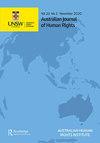把伯恩斯和香港放进时光机:北京《国家安全法》阴影下2021年的人权
Q1 Arts and Humanities
引用次数: 0
摘要
安德鲁·伯恩斯教授在香港从事学术研究期间,撰写了大量有关香港人权问题的文章,其中包括《人权法案条例》在保障和促进人权方面的作用。当Byrnes 2001年离开香港大学时,国家安全法被考虑,但可能不是北京在2020年6月30日赠送给香港的国家安全法(NSL)。本文以伯恩斯有关香港人权的著作为基础,批判性地审视《国家安全法》对香港受《基本法》和《基本法》保护的人权的影响。报告亦讨论香港法院在尽量减少《国家安全法》对人权的不利影响方面的角色。我认为法院应该依据基本结构原则来宣布《国家安全法》的相关部分违宪。然而,由于香港法院可能不愿意选择这样的选择,他们至少应该将《国家安全法》视为一部“可疑的合宪性”法律,并对其模糊和宽泛的条款进行狭义的解释,以在国家安全考虑和保护人权之间取得平衡。本文章由计算机程序翻译,如有差异,请以英文原文为准。
Putting Byrnes and Hong Kong in a time machine: human rights in 2021 under the shadow of Beijing’s National Security Law
ABSTRACT During his academic journey in Hong Kong, Professor Andrew Byrnes wrote extensively on various human rights issues in Hong Kong, including the role of the Bill of Rights Ordinance (BORO) in protecting and promoting human rights. When Byrnes left the University of Hong Kong in 2001, a national security law was contemplated, but perhaps not the type of National Security Law (NSL) that Beijing gifted to Hong Kong on 30 June 2020. Drawing on Byrnes’ human rights writings about Hong Kong, this article critically examines the impact of the NSL on human rights in Hong Kong protected under the Basic Law and the BORO. It also discusses the role of Hong Kong courts in minimising the adverse impact of the NSL on human rights. I argue that courts should rely on the basic structure doctrine to declare unconstitutional the relevant parts of the NSL. However, as Hong Kong courts may not be willing to opt for such an option, they should at least treat the NSL as a law of ‘suspect constitutionality’ and interpret its vague and wide provisions narrowly to strike a balance between national security considerations and the protection of human rights.
求助全文
通过发布文献求助,成功后即可免费获取论文全文。
去求助
来源期刊

Australian Journal of Human Rights
Arts and Humanities-History
CiteScore
1.30
自引率
0.00%
发文量
43
期刊介绍:
The Australian Journal of Human Rights (AJHR) is Australia’s first peer reviewed journal devoted exclusively to human rights development in Australia, the Asia-Pacific region and internationally. The journal aims to raise awareness of human rights issues in Australia and the Asia-Pacific region by providing a forum for scholarship and discussion. The AJHR examines legal aspects of human rights, along with associated philosophical, historical, economic and political considerations, across a range of issues, including aboriginal ownership of land, racial discrimination and vilification, human rights in the criminal justice system, children’s rights, homelessness, immigration, asylum and detention, corporate accountability, disability standards and free speech.
 求助内容:
求助内容: 应助结果提醒方式:
应助结果提醒方式:


